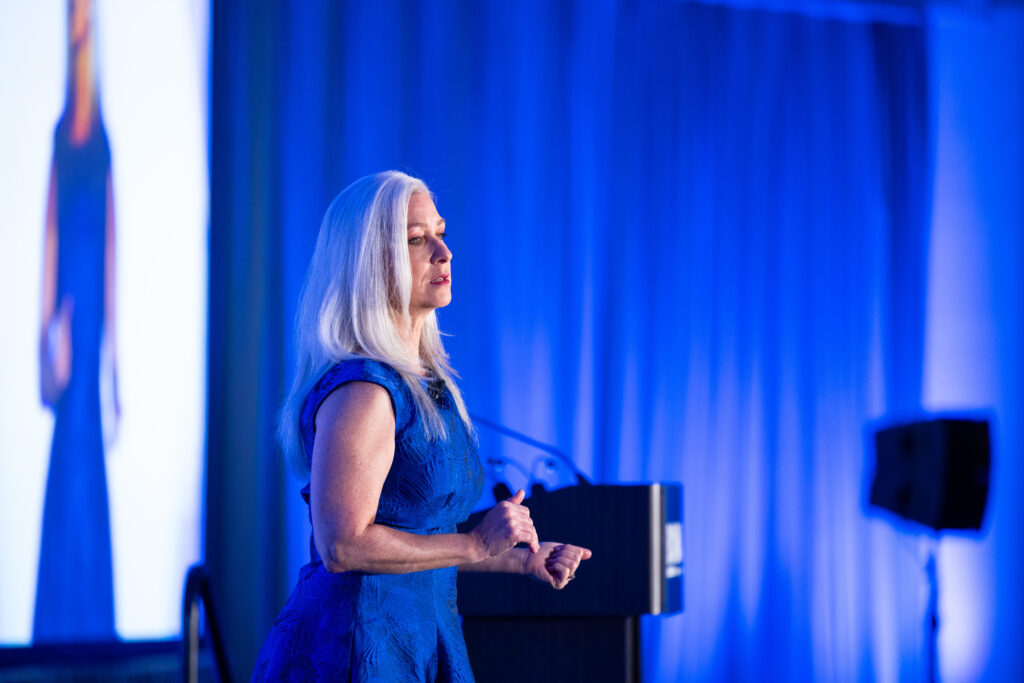BOMA International, Ella Krygiel
Wednesday, May 7, 2025
Over 1,400 health system executives, investors, developers and operators convened for the first day of the BOMA International 2025 Medical Real Estate Conference. Over this three-day conference, May 7-9 in Denver, CO, attendees participated in business networking, educational sessions and the Opening Keynote.
Wednesday’s educational sessions included important topics such as “Real Estate as a Tool for Solving Health System Challenges.” Within this session, sponsored by Lillibridge, Caroline Brown, Founder and Principal, CDB Strategies + Advisory Services, described her journey from politics to healthcare – and the trials and challenges of working during the pandemic. She explained how health system providers can view real estate as a strategic asset rather than a liability. To begin, she highlighted the top headlines shaping the healthcare industry, including:
- AI’s Transformation in Healthcare Diagnostics
- UnitedHealthcare CEO Fatally Shot in Public Incident
- Geisinger Nurses Strike for Better Pay and Safety
“For those that work in the healthcare provider space, it’s been a chaotic six months,” Brown says. “But, it’s not all bad. In fact, healthcare is said to provide the most rewarding career.” Addressing leading industry trends, Brown provided her solutions:
- Demand Surge
- Strategy: Create plug and play, replicable space models.
- Takeaway: Agility wins when demand doesn’t wait.
- Patient Expectations
- Strategy: Redevelop outpatient spaces to include placemaking amenities and gathering spaces.
- Takeaway: Consumer-centric real estate = brand extension and patient retention.
- Financial Instability
- Strategy: Grow outpatient revenue streams and lean on partners for capital.
- Takeaway: Real estate becomes a lever for margin improvement, not just an expense line.
- Workforce Challenges
- Strategy: Co-locate with education programs for pipeline and retention.
- Takeaway: The built environment and who you co-locate with signals how much you value your people.

Following Brown’s session, we had the privilege of welcoming Alex Azar, 24th Secretary of the U.S. Department of Health and Human Services, to lead our Opening Keynote session, co-sponsored by Arnall Golden Gregory LLP and American Healthcare REIT. As a Former Secretary of HHS, he contributed meaningfully to deliver COVID vaccines, tackle the opioid crisis, expand telehealth, enable healthcare-provider collaboration models and reduce drug prices. When Azar was Secretary, he worked under a $1.4 trillion budget. Now, he pointed out that the Department of Human and Health Services budget has expanded significantly, increasing to more than a third of the government’s budget. “If it were a nation – it would be the sixth largest,” Azar says.
Before diving into the expectations for what the future of the healthcare industry will hold – Azar broke down some of the biggest challenges impacting the sector, such as the bipartisan shift impacting political parties, the stress on drug companies and pricing – and not to mention tariff pressures.
Yet, he remained optimistic about a couple of key points, such as the strength of telemedicine and his belief that transparent pricing will increase “more than what we might have seen under the Biden administration.” Overall Azar states: “There is a lot of optimism – we’re in a period of transition. While DOGE is cutting a lot, what the news is today is not what it will be six months from now.”
Thursday, May 8, 2025
Day two of the BOMA International 2025 Medical Real Estate Conference continued with packed sessions and lively discussions as over 1,400 healthcare real estate professionals gathered in Denver. Attendees explored emerging trends, engaged in networking and heard from thought leaders shaping the future of healthcare real estate.

The day began with special events like the Women in Healthcare Real Estate Breakfast, sponsored by Holland & Knight and the Healthcare Provider Breakfast sponsored by Healthpeak. Following the breakfasts, attendees joined the Morning Keynote, sponsored by Healthcare Realty, with Dr. Marci Rossell, Expert Economic Forecaster, Former CNBC Chief Economist and Co-host of Squawk Box. Dr. Rossell began her presentation addressing the most pressing topic on everyone’s mind: our volatile economy. She immediately dived into the impact of tariffs, which are the steepest we have seen in over 100 years, along with the general public’s fear of a recession. While tariffs can significantly hinder long-term growth, Dr. Rossell argued that “the bar for a recession is extremely high” and that recessions stem from large, unexpected disruptions. In this case, she noted, the tariffs were anticipated. One key indicator that could signal a recession is a sharp rise in unemployment—a trend not currently evident. She pointed out that during a recession, weekly unemployment claims typically average around 600,000, whereas current figures remain closer to 250,000.


Following the outstanding Morning Keynote, attendees dispersed to concurrent education sessions. Among those sessions included “Capital Strategies: How Investors are Thriving in ‘25 and Beyond,” sponsored by Catalyst Healthcare Real Estate. The panel included moderator Brannan Knott, Executive Vice President, CBRE and speakers Zach Forrer, Associate Director, Invesco Real Estate; Chriss Papayannis, Vice President, RTG; and Anthony Sardo, Senior Director, Capital Markets, JLL. During their discussion, they examined how the MOB sector offers risk-adjusted stability and manageable vacancy. They also noted that alternative CRE sectors have gained prominence in response to structural shifts in the economy and evolving dynamics in property markets.
After the morning sessions, attendees gathered for the Keynote Lunch with Dr. Vin Gupta, Tech Innovation Leader; Healthcare Policy Expert and Chief Medical Officer, Amazon Pharmacy. Dr. Gupta highlighted cutting-edge technologies for disease detection, including the smart phone app Anura and the “heart seat” blood pressure monitor. “We do a terrible job at detecting diseases,” he remarked. “It’s estimated that 80% of those that have the flu don’t get diagnosed within a critical window.” He emphasized that with PPG technologies and other AI advancements, we could considerably reduce clinical reasoning errors — errors that contribute to over 100,000 deaths and hundreds of billions of dollars in waste.

Healthcare pressures remained a central focus during the afternoon sessions. The session, “Strategies for Structuring Leases and Negotiating Favorable Terms,” featured moderator Andrew Charara, Vice President of Transactions, Woodside Health, along with panelists Matthew Chiasson, Director, Stout, Hannah Mendheim, Associate Director – Real Estate Ops, SCA Health; Jennifer Tanner, Systems Director Real Estate Growth, CommonSpirit Health; and Brian Yeretzian, Principal, Polsinelli LLP. The panel discussed the biggest lease-related challenges currently affecting their portfolios. When the question was opened to the room, attendees responded via a live poll, revealing that over half identified high construction costs and rising rents as their greatest form of stress.
Despite ongoing challenges, most speakers emphasize the importance of maintaining a positive outlook for the future. In the education session titled, “Beyond the Hospital Walls: Outsourcing Healthcare Services,” moderator Malika Basheer, Senior Vice President, ReThink Healthcare Real Estate, was joined by Jennifer Seiler, Managing Director, Cushman & Wakefield; and Dan Storey, Real Estate Manager, HCA, to discuss the rise of top revenue-generating specialties such as cardiology, orthopedic surgery and gastroenterology. Looking ahead, Basheer advised attendees to “follow the data,” noting that over the next five years, specialties like endocrinology, psychiatry and physical therapy are projected to see the most growth among outpatient services.

Friday, May 9, 2025
The 2025 Medical Real Estate Conference concluded with education sessions, closing remarks and prize drawings. During the “C-Suite Perspectives: Medical Real Estate Strategies and Investments” session, featuring Moderator Kerrie Bartel-Chirstensen, VP, Real Estate Strategy & Development, CommonSpirit Health with speakers Peter Bulgarelli, CEO, Lillibridge HealthcareServices; Jarrod Daddis, President, NexCore Group; Troy Freeman, Vice President, Real Estate, Banner Health; and Andrew Gaasch, Mountain Region President, CommonSpirit Health,the panel analyzed the critical aspects of healthcare real estate strategy and investment.
Several key themes emerged in the executive discussion:
- The Importance of Relationships and Building Value
- AI’s Growing Role in Efficiency and Innovation
- Focus on Outpatient and Ambulatory Services
Building trust among system partners, clients or communities emerged as a major takeaway throughout the conversation. Panelists also discussed the growing role of AI, particularly in enhancing the physician-patient relationship. With advancements like ambient listening technology that enables AI to take notes during appointments, providers are now able to “be present in the room,” Freeman explained. Looking ahead, a shared focus among the panelists was the expansion of ambulatory and outpatient services. “Outpatient services are growing from 35% to 40% in the next five years,” Daddis noted.
Don’t forget to save the date for the 2026 Medical Real Estate Conference in San Diego, CA: April 29 – May 1, 2026!